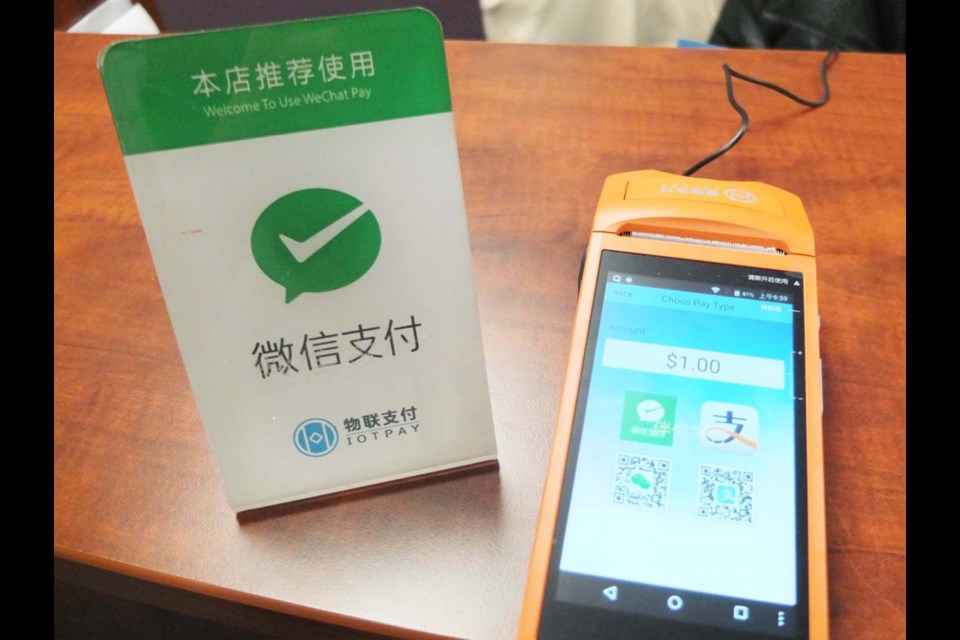As Apple Pay and other American-based mobile payment companies struggle to catch on in Canada, two Chinese e-wallet services have entered Richmond and are taking off.
Increasingly, stores and services in Richmond have notices saying: “Welcome to use ‘WeChat Pay’ and/or ‘Ali Pay’” – two mobile payment systems that are prevalent in China, respectively associated with WeChat (a popular chatting app) and Alibaba (a Chinese online retail giant).
Consumers can now pay for products in select Richmond stores with their Chinese money from a WeChat/Ali wallet linked to their Chinese bank account, via a simple scan of their phone.
After one to three days, stores will receive the payment in their Canadian bank accounts converted into Canadian money by real-time Chinese Yuan currency rates. This all happens through local tech companies such as Motion Pay and IOT Pay.
“It has been very popular,” said Dennis Li, president of Richmond-based Universal Learning Institute, who started accepting WeChat Pay earlier this month.

“Students don’t need to pay for currency exchange or the fee to transfer money overseas through the bank. It has saved so much money and work,
“For us, it’s faster, more convenient, and we still receive payment in Canadian dollars.”
Li said the whole payment process can take less than one minute and payers will receive a paper receipt as well as an e-receipt.
For every transaction, the merchant needs to pay the tech company a service fee of 1.5 per cent, which Li thinks is reasonable.
“We have to pay a service fee for purchases with a credit card anyway, at the same or a higher rate.”
Ottawa-based Motion Pay now has more than 600 partner merchants across Canada, almost half of which are in B.C., including some big names like Birks and Tom Lee Music, according to the company’s CEO Riven Zhang.
“I went to China for a business trip in 2015 and found so many stores accepting mobile payment,” said Zhang.
“People didn’t carry wallets but paid by their phone instead — it was so awesome. I thought it was a good idea to bring to Canada.”
After reaching agreements with Tencent and Alibaba, who own the two payments, Zhang developed the technology to bridge the gap between WeChat/Ali Pay and Canadian stores.
“The service now is only available for Chinese nationals or residents since a registered Chinese ID is required ahead of payment,” said Zhang.

And payers using the service abroad need to comply with policies and regulations of the Chinese government.
Firstly, the merchants have to apply and get approval from Tencent and Alibaba“Any money-related businesses, including real estate, insurance companies and casinos cannot use our service,” Zhang said.
He noted that this is to avoid asset transfers and large investment practices across borders through mobile payment.
The spending limit, depending on the Chinese bank account linked to the e-wallet, can go up to $10,000 per transaction and $40,000 per day.
But this does not apply to individual mobile transfers, which have much lower limits.
The Chinese government can “retrieve purchasing data from Tencent and Alibaba if they want to,” according to Zhang.
Experts said WeChat/Ali Pay’s entry to Canada does not only make it more convenient for businesses and Chinese consumers, but will also have an impact on the wider economy.
“The promised 1.5 per cent service fee and zero currency exchange charge are very competitive,” said Werner Antweiler, director of Sauder School of Business Prediction Markets.
“This will put pressure on the conventional credit-card based payment services in North America, which are way too expensive and a bit antiquated.”
He adds that the service fee of Visa and other credit cards can go as high as three to five per cent.
“Obviously it (WeChat/Ali Pay) will start in those communities with strong relations to China.
“But if merchants start promoting these services and roll in some of the base of Visa, MasterCard and other providers, they will have to figure out a way to make their services cheaper,” said Antweiler.
He explained that the business model of WeChat/Ali Pay is based on ancillary services instead of commissions, which allows them to keep the fee low.
Antweiler adds the fact that WeChat/Ali Pay is connected to the debit card instead of credit card can help “get people to only buy things they can afford rather than buying it with the credit debt that many consumers face today.
“Mobile payment is the trend and competitions in this area are always welcome. I will be very interested to see how the new payments will catch on.”



